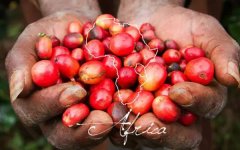Yemen is the first country to grow coffee as a crop. Yemeni mocha coffee culture.

Professional coffee knowledge exchange more coffee bean information please follow the coffee workshop (Wechat official account cafe_style)
The Republic of Yemen (English: Yemen Republic), located at the southwest end of the Arabian Peninsula, bordering Saudi Arabia and Oman, bordering the Red Sea, the Gulf of Aden and the Arabian Sea. In May 1990, it was formed by the merger of the Arab Republic of Yemen (Northern Yemen) and the people's Democratic Republic of Yemen (Southern Yemen).
With a written history of more than 3000 years, Yemen is one of the cradles of ancient civilization in the Arab world. Yemen is one of the least developed countries in the world, which is not self-sufficient in food and relies on imports. There are sandstorms common in the desert in summer, and desertification is becoming more and more serious due to overgrazing. The country's cotton is of good quality, a large number of exports every year, coffee planting area is also very large, occupies an important position. In recent years, the Government is committed to
In order to reduce the budget deficit and government expenditure, strive to control inflation and stabilize prices.
Yemeni mocha coffee culture
Yemeni mocha is one of the oldest coffee in the world, but until recently, Yemeni mocha has come to be regarded as one of the best and most delicious coffee in the world. Mocha coffee, which has a long history, is synonymous with coffee. Its unique aroma and sour taste have deeply attracted many coffee lovers.
The name mocha comes from Mocha in Yemen, a port that can no longer be used]. It has almost been filled with sand, no longer a port, but a sandbar.
As a kind of individual coffee, Yemeni mocha has a unique charm and a long history.
Before the 6th century in the park, Yemen was called Arab, so the coffee trees transported from them to other places were also called Arabian coffee trees.
Yemen is the first country in the world to produce coffee on a large scale as a crop. The method of cultivation and treatment of mocha coffee in Yemen today is basically the same as that of hundreds of years ago. On most coffee farms in Yemen, coffee farmers still resist the use of artificial chemicals such as chemical fertilizers. Coffee farmers plant poplars to provide shade for coffee to grow. As in the past, these trees are planted on steep terraces to maximize the use of less rainfall and limited land resources. What is more unique is that Yemeni mocha beans are still shipped in a bag made of straw, rather than chemical woven bags in other places. If you are a pure naturalist, the Yemeni mocha can satisfy your desire to drink coffee that has been completely natural.
The price of Yemeni coffee in the international market has not been low, mainly because Yemeni coffee is very popular in countries and regions where "Turkish" coffee is popular. In Saudi Arabia, the Yemeni mocha is so spoiled that people there are willing to pay a high price for low-quality mocha coffee. This special fondness for mocha keeps the price of mocha coffee high in the world coffee market.
Important Notice :
前街咖啡 FrontStreet Coffee has moved to new addredd:
FrontStreet Coffee Address: 315,Donghua East Road,GuangZhou
Tel:020 38364473
- Prev

Recommend coffee books worth collecting by novice baristas! Long time for knowledge
Professional coffee knowledge exchange more information about coffee beans Please follow the coffee workshop (Wechat official account cafe_style) Coffee in the world, books are also essential. Whether coffee lovers, enthusiasts, beginners, or baristas, coffee shop owners, coffee industry workers, want to have a more comprehensive and in-depth understanding of coffee, a few good books are essential, listed here
- Next

Do all coffee trees have the same characteristics of Alabica Roberta coffee tree?
Professional coffee knowledge exchange more coffee bean information Please pay attention to Coffee Workshop (Wechat official account cafe_style) Coffee tree, for Rubiaceae perennial evergreen shrubs or small trees, is a horticultural perennial cash crop, with the characteristics of fast-growing, high yield, high value and wide market. Wild coffee trees can grow to 5 to 10 meters tall, but the coffee trees planted on the manor are
Related
- What documents do you need to go through to open a coffee shop? coffee shop coffee shop certificate processing process
- How to purchase Coffee beans in small Cafe how to choose a suitable supplier for domestic Coffee supply Company
- How to drink Starbucks Fragrance White Coffee? how to make Australian White Coffee? what Italian coffee beans are recommended?
- The Story of Flora Coffee: the name of Flora Coffee Bean and the implication of the Flowers on Florna Coffee
- How much does a cup of coffee cost? How much is the profit of a cup of coffee? What is the profit of the coffee shop in a year?
- Yunnan small Coffee, known as "fragrant Coffee", introduces the characteristics of Alpine Arabica Coffee producing areas in Yunnan, China
- 2023 latest Starbucks full menu price list how much is a cup of Starbucks coffee what is better to drink the most popular hot and cold drinks recommended
- Starbucks different kinds of Coffee Price list Starbucks menu 2023 Top Ten Best drinks in Starbucks
- Starbucks Spring praise Comprehensive matching Coffee Bean theme Story Packaging implication and taste description
- The cost of a cup of coffee latte American coffee cost price and selling price

